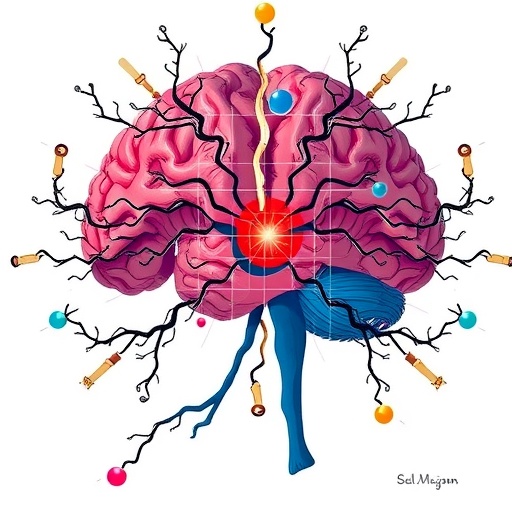Recent findings from the COSINUS cohort study shed new light on the intricate cognitive challenges faced by people who inject substances (PWIS), a group often overlooked in neurological and psychiatric research. Published in BMC Psychiatry, this comprehensive study delves into how polydrug use, prevalent in this population, influences two core cognitive functions essential in everyday functioning and addiction processes: episodic memory and inhibitory control. The implications of these findings resonate strongly within the fields of addiction psychiatry, neuropsychology, and harm reduction.
Substance abuse’s detrimental cognitive consequences have been extensively documented, especially concerning single substances like alcohol or cannabis. However, the landscape significantly shifts when examining polydrug use—a common scenario for many PWIS. This study endeavors to fill the gap by exploring cognitive function within the complexity of concurrent substance use. Importantly, the researchers incorporated factors frequently neglected in prior works, such as the impacts of hepatitis C virus (HCV) and human immunodeficiency virus (HIV) infections, both highly prevalent among people who inject drugs due to exposure during frequent injections and shared equipment.
The COSINUS research team recruited 383 individuals from drug consumption rooms and harm reduction facilities, reflecting a real-life sample that encapsulates the heterogeneity of this population. Using validated neuropsychological tests—the Go/No-go paradigm for assessing inhibitory control and the 5-word test for assessing episodic memory—they provided robust and objective assessments of cognitive functioning. These tools helped ascertain how substance use patterns, alongside socio-demographic and health-related variables, intertwine to affect cognition.
Their results painted a sobering picture, though with some nuances challenging conventional expectations. First and foremost, polydrug use was nearly ubiquitous, with a staggering 93% of participants engaging in multiple substances simultaneously. Cognitive deficits were notably linked with advanced age, risky alcohol consumption, and cannabis use, all correlating with poorer memory performance. Intriguingly, psychostimulant use appeared to be associated with a cognitive benefit, specifically in episodic memory tasks, suggesting complex interactions between certain substances and brain function that warrant further exploration.
Educational attainment emerged as a critical modulator of inhibitory control, with higher education levels correlating with better impulse regulation. This finding underscores the protective role of cognitive reserve, which may buffer against some negative effects of substance use. Conversely, individuals actively seeking employment assistance or educational training demonstrated poorer free recall ability. This could reflect the greater cognitive demands or stress associated with these endeavors, or alternatively, may highlight that those struggling most cognitively are more likely to require such support.
The role of infectious diseases common in this population came under careful scrutiny. Both HCV and HIV infections were found to negatively impact cognitive performance; however, the data were not entirely consistent. This suggests that while these infections exacerbate cognitive impairment, their effects may vary depending on factors such as disease progression, treatment status, or co-occurring health issues. Importantly, the study reinforces the intertwining of physical health and cognitive function in marginalized populations.
An exciting and potentially transformative finding was the positive association between attending drug consumption rooms (DCRs) and cognitive outcomes. Participants who frequented these harm reduction spaces showed better memory and inhibitory control. This effect could stem from the stabilizing environment, reduced exposure to harm, or the comprehensive services offered within DCRs, highlighting the broader benefits of integrating cognitive health monitoring and support within harm reduction frameworks.
The study’s conclusions emphasize the urgent need for effective screening and tailored interventions addressing cognitive deficits among people who inject substances. Given the multifactorial influences on cognition—from polydrug use and infections to educational and social factors—the authors advocate for multidisciplinary approaches that combine mental health care with harm reduction services. Such integration not only supports cognitive health but also enhances overall treatment engagement and recovery prospects.
Cognitive impairment in PWIS can severely hinder daily functioning, decision-making, and adherence to treatment, thereby perpetuating cycles of addiction and social marginalization. By revealing specific risk factors and potential protective elements like education and DCR attendance, the COSINUS study provides actionable insights for clinicians, public health professionals, and policymakers seeking to optimize interventions in this vulnerable group.
Moreover, the nuanced outcomes related to psychostimulants invite further mechanistic research to understand underlying neurobiological pathways. These findings challenge prevailing assumptions about the uniform harm of all substances on cognition and point towards tailored interventions considering individual substance profiles and coexisting conditions.
The integration of neuropsychological assessments within routine harm reduction and addiction treatment services could become a critical step forward. Early identification of memory and inhibitory control deficits allows for targeted cognitive rehabilitation strategies, potentially improving quality of life and reducing relapse risk.
In sum, the COSINUS cohort has illuminated key aspects of cognitive functioning in people who inject substances by situating polydrug use within a comprehensive biopsychosocial framework. Addressing the complex interplay of aging, infectious diseases, and socio-educational factors alongside substance use offers a roadmap for evolving addiction treatment paradigms toward more holistic, patient-centered care.
As the addiction crisis evolves globally, and the demographics of substance users shift, embracing such integrative research approaches will be paramount. This study not only advances scientific understanding but also paves the way for impactful clinical and community interventions aimed at preserving and enhancing cognitive health in marginalized yet resilient populations.
Subject of Research: Cognitive functioning, specifically episodic memory and inhibitory control, among people who inject substances (PWIS), focusing on the impacts of polydrug use, infectious diseases (HCV/HIV), and socio-educational factors.
Article Title: Episodic memory and inhibitory control in people who inject substances results of cohort COSINUS study
Article References:
Lalanne, L., Kirchherr, S., Audran, M. et al. Episodic memory and inhibitory control in people who inject substances results of cohort COSINUS study. BMC Psychiatry 25, 853 (2025). https://doi.org/10.1186/s12888-025-07223-2
Image Credits: AI Generated




